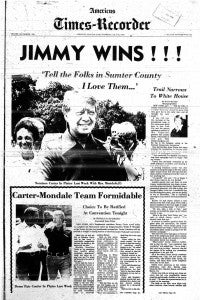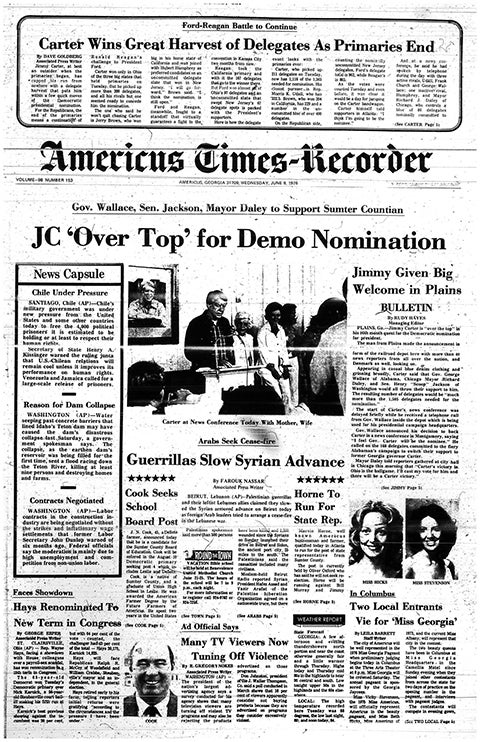‘A New Mood in America’: Ga.’s Carter won ‘76 Democratic nomination
Published 12:00 pm Thursday, August 11, 2016
By D. JASON BERGGREN
www.americustimesrecorder.com
With a win in the South Dakota primary on June 1 and an even more decisive win in the Ohio primary on June 8, Jimmy Carter finished the 1976 primary campaign season with the most election victories and the most convention delegates. A little over a month later, he would formally accept the Democratic Party’s presidential nomination on July 15, in New York City.
In all, Carter won 18 primary elections and the important “first-in-the-nation” Iowa Caucus. For his final wins, he beat Arizona congressman Morris Udall 41 – 33 in South Dakota and then 52 – 21 in Ohio, where the “Peanut Brigade” once more provided important support for their fellow Georgian. The Americus Times-Recorder reported that the rallying cry for Ohio was, “Mount ‘em up, and move ‘em out. Let’s invade the north for Jimmy.”
Though his opponents managed to defeat him in four June primaries (Rhode Island, Montana, New Jersey, and California) and in the Arizona and Washington caucuses, it was not enough to erase Carter’s advantage. The so-called “A.B.C.” (Anyone but Carter) movement failed to stop Carter’s momentum and consolidate behind an alternative candidate.
According to the Americus Times-Recorder in its June 9 edition, Carter had 1,118 of the 1,505 needed to win the Democratic Party’s presidential nomination on the first ballot. In the delegate hunt, no other candidate was even close to Carter. His remaining opponents trailed far behind. Udall had 333 delegates and California governor Jerry Brown had 229. With an insurmountable lead, the headline of the Americus Times-Recorder was “JC ‘Over Top’ for Demo Nomination”.
Carter said his success was due to the fact that voters rejected “those who want to continue politics as usual” and maintain “at all cost their entrenched, unresponsive political power.” He exclaimed that he did not have to depend on Massachusetts senator Edward Kennedy, Minnesota senator Hubert Humphrey “or anyone like that to put me in office.” Survey data buttressed Carter’s point by showing that his supporters were mostly attracted to him for his personal appeal and qualities as opposed to his stance on specific policy issues.
As the campaign for the Democratic nomination was coming to an end, Georgia’s junior senator Sam Nunn said that it was becoming increasingly likely that “we are going to elect a president of the United States from Georgia.” Carter’s success was proof that the regional division between North and South was overcome. Nunn observed, “We are now truly unified, one nation under God.”
After the voters had their say, Carter’s remaining rivals began to fall in line and endorse his candidacy. Time magazine described it as a “stampede to Carter”. He quickly had commitments from Alabama governor George Wallace, Washington senator Henry Jackson, and party boss Chicago Mayor Richard Daley who held a block of delegates from Illinois. Those pledges of support and endorsements from uncommitted delegates brought Carter the needed number of delegates to be designated the Democratic Party’s presumptive nominee. As of June 9, the Democratic National Committee estimated that Carter had locked up a majority of delegates with 1,514.
On June 10, former primary opponents Pennsylvania governor Milton Shapp and West Virginia senator Robert Byrd jumped on the Carter bandwagon. The following week two more former rivals, Idaho senator Frank Church and former Oklahoma senator Fred Harris, threw their support to the frontrunner from Georgia. Senator Church congratulated Carter and said that as a southerner his successful candidacy “brought an end to the regional prejudices that have marred our national politics for more than a century.”
Even Humphrey, who had been planning to enter the presidential race if no clear winner emerged, seemed ready to get behind Carter. He said, “The primaries now are over and Gov. Carter has a commanding lead. He is virtually certain to be our party’s nominee.”
Refusing to surrender after his decisive win over Carter in the June 8 California primary, 59 – 20 percent, Brown vowed to fight on to the July 12-15 Democratic National Convention. But his effort proved fanciful. While Carter may not have been the first choice of the Democratic Party establishment, he did earn their respect. As Mayor Daley explained to Time, “This man Carter has fought in every primary…He’s got courage. I admire a man who’s got courage. He started out months ago, entered into every contest in every state, and he won’em and he lost’em, and by God, you have got to admire a guy like that.”
In the roll call of states and territories at the convention, Carter easily surpassed the 1,505 needed to clinch the nomination. In the rounded vote, he was the first choice of 2,239 delegates. Congressman Udall, Carter’s principal challenger in the primaries, received 330 votes. Governor Brown finished third with 301 votes, Governor Wallace had 57, and Ellen McCormack, who ran as the anti-abortion candidate, received 22. The remaining delegate votes were scattered votes for other Democrats.
The Americus Times-Recorder headline for July 15 was “Jimmy Wins!!!” After winning, from New York’s Americana Hotel where the Carter family was staying, Carter sent his many thanks to his home community for their solid support. As told to Rudy Hayes, the paper’s managing editor, Carter said, “Tell the folks in Sumter County I love them all and also that I couldn’t have won without the great help they gave me in the early days and all through my campaign.”
 Also on July 15, Carter announced his choice of Minnesota senator Walter Mondale for vice president. Later that evening, he delivered his convention acceptance speech. The speech lasted for a little over 39 minutes.
Also on July 15, Carter announced his choice of Minnesota senator Walter Mondale for vice president. Later that evening, he delivered his convention acceptance speech. The speech lasted for a little over 39 minutes.
To thunderous applause at Madison Square Garden, he began with a simple, yet memorable line of introduction and purpose. “My name is Jimmy Carter, and I’m running for President.” He used this opener many times on the campaign trail for the past year and a half. Of course, at that moment, no one was asking, “Jimmy who?”, or “Jimmy is running for what?” any more. Since December 1974 when he formally declared his candidacy for the highest office in the country, Carter consistently addressed those questions. It was conceivable that the candidate from southwest Georgia could be elected the next president of the United States.
In his speech, Carter expressed his delight that the 1976 convention was much more harmonious than the 1968 and 1972 Democratic conventions and that he presided over a mostly united party. Though he ran as a Washington outsider, he reached out to the mainstream of the party. He recognized some of the heroes of the Democratic Party, acknowledged its diversity, and cited a few legislative successes in its progressive legacy.
The country had been through some tough times: war, scandal, the collapse of the Nixon-Agnew administration, and an unpopular presidential pardon. But things could be reversed. Carter was ready to take on the Republican Party, whether it was a party led by President Gerald Ford or by former California governor Ronald Reagan. He promised delegates that “our nation’s best is still ahead.”
The following are excerpts from Carter’s remarks.
“It’s been a long time since I said those words the first time, and now I’ve come here after seeing our great country to accept your nomination.
I accept it, in the words of John F. Kennedy, with a full and grateful heart and with only one obligation: to devote every effort of body, mind and spirit to lead our party back to victory and our nation back to greatness.
It’s a pleasure to be here with all you Democrats and to see that our Bicentennial celebration and our Bicentennial convention has been one of decorum and order without any fights or free-for-alls. Among Democrats that can only happen once every two hundred years. With this kind of a united Democratic Party, we are ready, and eager, to take on the Republicans — whichever Republican Party they decide to send against us in November.
Nineteen seventy-six will not be a year of politics as usual. It can be a year of inspiration and hope, and it will be a year of concern, of quiet and sober reassessment of our nation’s character and purpose. It has already been a year when voters have confounded the experts. And I guarantee you that it will be the year when we give the government of this country back to the people of this country.
There is a new mood in America. We have been shaken by a tragic war abroad and by scandals and broken promises at home. Our people are searching for new voices and new ideas and new leaders.
Although government has its limits and cannot solve all our problems, we Americans reject the view that we must be reconciled to failures and mediocrity, or to an inferior quality of life. For I believe that we can come through this time of trouble stronger than ever. Like troops who have been in combat, we have been tempered in the fire; we have been disciplined, and we have been educated. Guided by lasting and simple moral values, we have emerged idealists without illusions, realists who still know the old dreams of justice and liberty, of country and of community.
D. Jason Berggren is an associate professor of political science at Georgia Southwestern State University.





